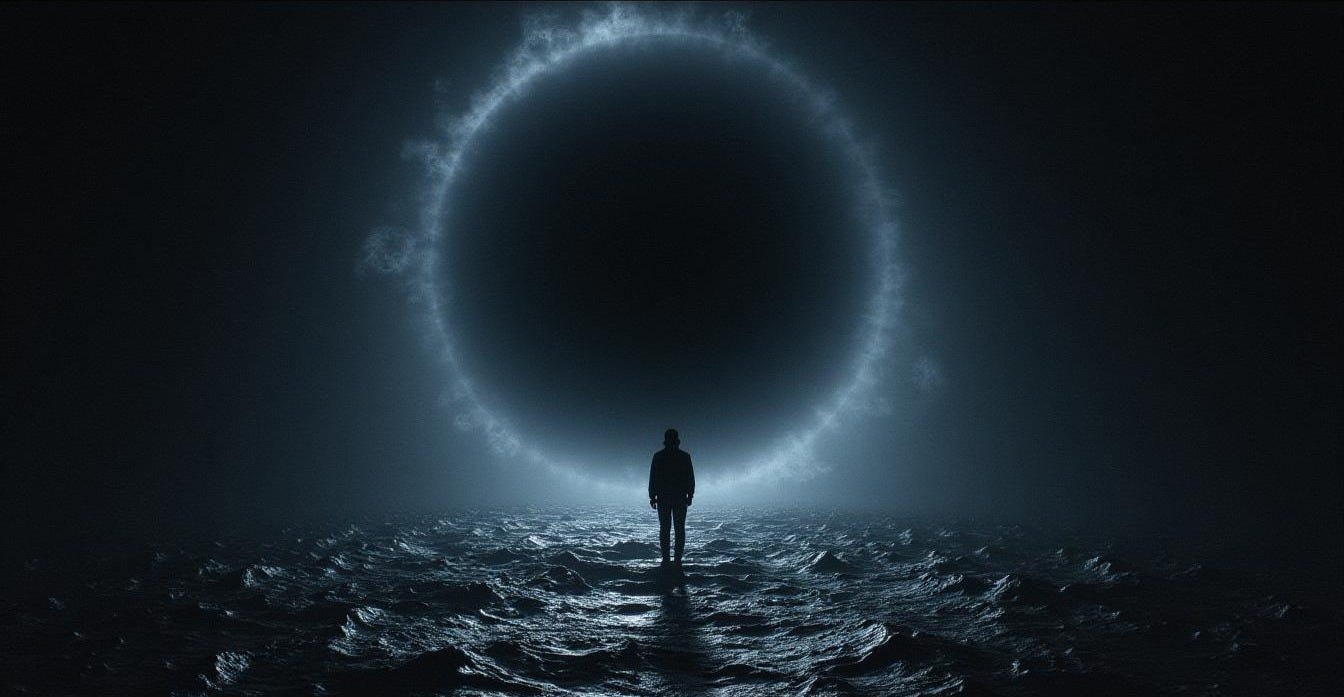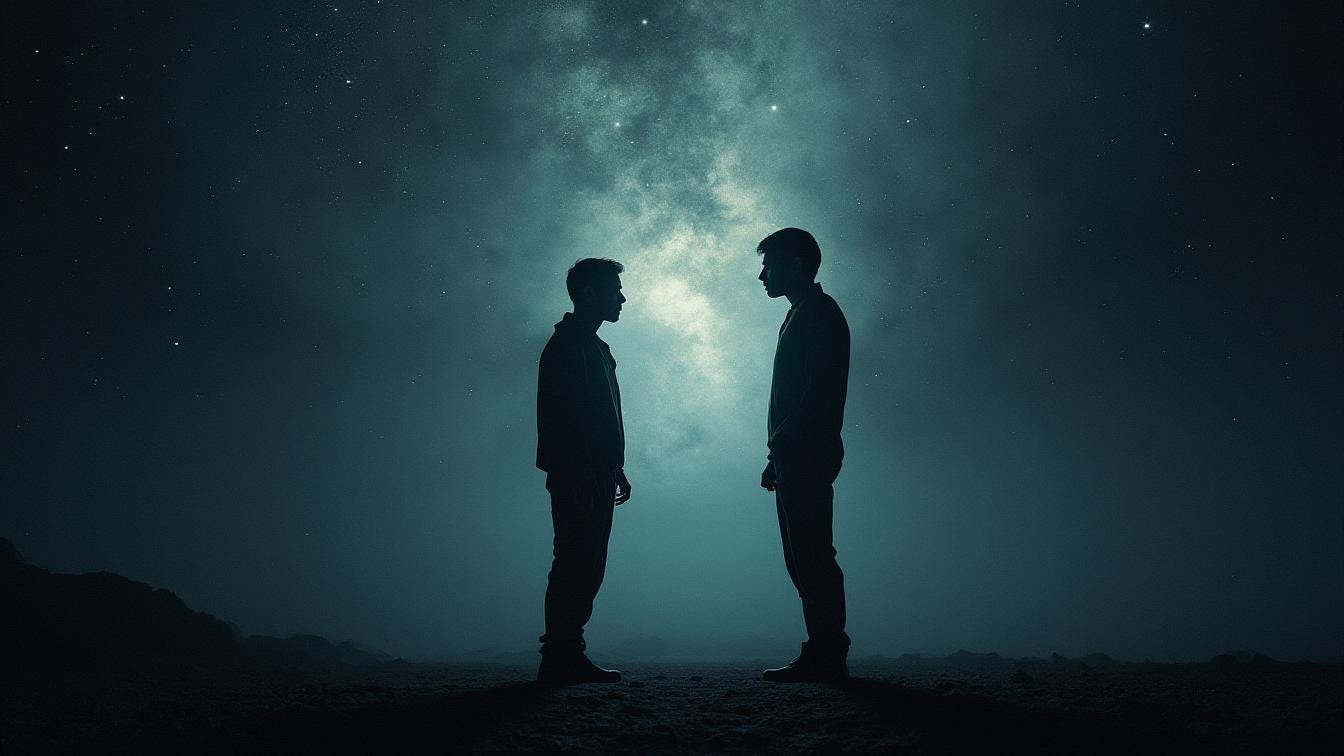People are mirrors. What you see in others has more to do with you than them.
My jaw tightened as I glanced at my phone and, once again, saw George’s daily text: Hey brother how do you feel today! I felt annoyed reading the same salutation from my friend George, the Peruvian Don Juan. I couldn’t tell if my irritation stemmed from what felt like a low-effort check-in (geez it wasn’t even a question), or if it was the creeping paranoia that I was interacting with an AI-generated chatbot of George.
I took a deep breath, trying to calm my agitation before it turned into anger. I replied, About to wind down. How was your day? hoping he’d pick up on the hint that I wasn’t in the mood to revisit the same familiar feeling of despair and the quiet malaise that had been seeping beneath the surface.
I waited for his typical SSDD response. The usual litany: that he felt tired, sad. That he didn’t sleep well. That he was feeling lonely. That he missed his ex. That he wanted to run off to the woods. That he felt like he was falling behind in life.
I wondered why George wanted to be my friend. Was this just a classic case of misery loving company? An emotional parasite? Was he idealizing me, and once he saw my flaws, abandon me? Would he run when I set boundaries? Was I just another placeholder to fill the void in his life? I felt increasingly paranoid and overwhelmingly unsafe, wanting to withdraw, to cease witnessing him drown, and most importantly prevent myself from being pulled under too.
I reminded myself that I didn’t really know this Latin Lothario. He rushes intimacy with reckless speed, flooding the space with affection and urgency. I finally recognized this as a form of distress masked as devotion. I’ve ignored these red flags in the past, and my naiveté always ended in pain and sorrow.
George and I are too different, incompatible. I’m highly educated, white-collar, from a stable family, I create communities… George is working class, comes from a challenging childhood, a lone wolf, lost and aimless.
Wait, was George a serial killer? A modern day Ted Bundy?
I wanted to unfriend George, extricate myself from his gravitational undertow. I wanted to free myself from his emotional black hole. Simultaneously, these emotions contradicted every virtue I held high, that I care about people, all people, that I show up for people. I resented him for making me feel conflicted, for making me feel unworthy.
It’s hard to soar with the eagles when you’re groveling with turkeys. ~My Dad
Clearing Out The Fear
Over the Fourth of July weekend, I was in SoCal when I started receiving the same check-in texts from George. I knew I needed to talk with him and clear things up as soon as I got back to NorCal. We agreed to meet on Tuesday instead of our usual Monday. He texted me, I’ll miss you.
Late Monday evening, my phone buzzes and I see a missed text from George, Missed you, brother.
All Tuesday morning, I felt anxious about meeting up with George, coming clear and setting some boundaries. I need relief. Around midday, he texted, Not sure if it’s the best day for me to meet.
I texted back, No worries, even though I felt both let down and annoyed. We agreed to meet Wednesday afternoon instead.
Late Wednesday morning, I see a text notification from George, I’m not sure if I’ll have time to hang out today. I feel weird 😆
That was it. My blood boiled. My body flooded with emotional lava, erupting in my head, dizziness followed. I paused, took deep breaths, trying to calm myself. After about ten minutes, the rage had settled enough for me to feel composed enough to respond, requesting we talk over a call. I replied, Do you have time for a clear?
On the call, I speak with honesty edged in increasing frustration. I asked him to clarify his intentions. Did he really miss me, or was I just a placeholder in his loneliness? Why the constant check-ins? Did he even know why he was reaching out?
I ask for space and distance, to slow things down.
This is usually the point where people push back, get defensive, or disappear altogether. To my surprise, George is gracious. He feels sad and agrees to give some space.
Clear Reclamation
Over the next couple of days, I started to relax, sitting in my newfound space, to just be with myself. As the rigidity in my body loosened, I began to question my story around George. I began to widen my purview and noticed it wasn’t just George I felt unsure of, but that there was a larger, darker infection tainting all my relationships, including the lack of inspiration I felt around writing and work.
I recognized this pattern, my default programming: the tendency to see everyone and everything through a negative and critical filter, the compulsion to lash out and purge the negativity.
Immediately I feel lighter, quickened and clear. I now know what must be done.
George and I meetup mid-afternoon at Hippie Hill on Monday on a relaxing, breezy day. The sun feels filtered, warming the skin as the the wind whisks the radiation away. The fog has cleared enough for a pleasant walk and talk around Golden Gate Park. An idyllic SF summer day.
The moment I spotted George across the grass, a wave of awkwardness hit me, until he flashed that mischievous, yet inviting smile. He pulls me into a firm embrace, his voice wrapped with warmth as he says, “It’s great to see you.” And just like that, something softened in me. Hearing him call me “brother” echoed with sincerity, and his calm, rooted energy felt reassuring, safe. No wonder women love him.
He tells me he’s been worried about our friendship. He’s felt tremendous anxiety over the last few days. Hearing his vulnerability lands differently. I no longer feel fear. Instead I feel his concern, his care.
I thanked him for giving me the gift of space, to realize what was really plaguing me. I tell him the truth: the problem was me. The red flags were mine. I was the source of my insecurities.
I wasn’t in a good emotional place. I didn’t feel good about myself. I realized that George’s suffering was triggering my own feelings of unworthiness. His struggles — feeling lost, aimless in life, lonely — were also my own. And I didn’t want to be reminded of my own despair.
I share that over the last few days I turned inward, searching for the shadowed malignancy that had been poisoning my emotional well-being.
My self-diagnosis was simple and complex: compounding grief, hiding in plain site. And just beneath my grief lurked a more malicious and pervasive pathogen, the silent saboteur: shame.
I had completely forgotten about the sudden loss of my beloved Center community and sanctuary that I had relied on for three years to nourish my need for belonging. Most importantly, the connections I had created and cultivated were now distant or gone altogether, and their absence left an unseen void within me, a gaping hole in my heart.
In the emptiness, I unknowingly invited fear in, turning friends into adversaries, sadness and disappointment into anger and bitterness, and resurrecting old dark tales filled with cynicism and self-loathing.
I tell George that I’m grateful — for his magnanimous grace, for giving me the space to grow, for standing beside me as I faced my fears, for still wanting to be my friend, for however long it lasts, even if it ends in fire and fury.
His impact will not be forgotten. I feel lighter, buoyed by hope. With awareness comes agency. I can choose not to run, not to project, not to avoid. Instead, I can own and embrace my shame. By integrating it, I create capacity for brighter, softer emotions. I feel whole. For me, there is no greater salvation than feeling connected to the full human experience.
Walking up to the California Academy of Sciences, we passed a young European family. The father politely asked if I could take their picture. I said yes and crouched to get the right angle. As I looked through the screen, something special about these strangers hit me. There it was: love.
Thank you for reading.
Shame is the shadow of love. ~PJ Harvey







